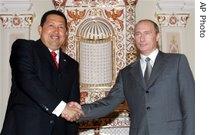-
(单词翻译:双击或拖选)
Caracas
28 June 2007
Venezuelan President Hugo Chavez continues to accuse the United States of plotting to invade his country, as he engages in a whirlwind trip to Russia, Belarus and Iran. VOA's Michael Bowman reports from Caracas that many Venezuelans view the trip as an opportunity for Mr. Chavez to buy more foreign armaments, but not all are convinced the military buildup is money well spent.
 |
| Hugo Chavez (l) and Vladimir Putin in Moscow, 28 Jun 2007 |
He said, "We don't want war, but we also think the American empire will want to attack Venezuela, besides its everyday aggression1. If there is an attack, like the ones over the past 100 years throughout the whole world, in Cuba, in Latin America in the Caribbean, in South America - we are ready to die in order to defend [the] sacred sovereignty of Venezuela."
The Bush administration dismisses Mr. Chavez' claims, saying it has no plans to invade Venezuela.
Venezuela has already purchased billions of dollars worth of Russian rifles, helicopters and military planes. Reports from Moscow quote Kremlin officials as saying Venezuela has also shown interest in Russian submarines and air defense2 systems.
Before becoming president, Mr. Chavez was a paratrooper who led an unsuccessful coup3 attempt in 1992. In analyzing4 his actions as president, one must not lose sight of his military background, says Venezuelan professor and foreign affairs specialist, Ana Julia Jatar.
"President Chavez is a military man," said Ana Julia Jatar. "He views politics as a war. With this trip, he is sending a message of war, saying, 'I am making preparations in case the United States wants to invade my country.'"
In Iran, Mr. Chavez will meet with President Mahmoud Ahmadinejad, who has referred to the Venezuelan leader as his "brother." Mr. Ahmadinejad is also a fierce critic of the United States. Jatar says the visit to Tehran - Mr. Chavez's second - is unprecedented5 for a Latin American leader.
"It [the trip] has no economic or social benefit for Venezuela," she said. "It has but one benefit, which is to further President Chavez's vision of a multi-polar world in which he is the head of one of the poles."
On the streets of Caracas, some say it is only logical that Mr. Chavez keep the military strong. Andy Bermudez once served in Venezuela's navy.
"The armed forces must be complete with the arms it needs," he said. "Every country must maintain its armed forces in case of any eventuality, for any conflict that may come."
Luisa Rodriguez has a different point of view.
"I think, instead of buying arms, we should be doing more to help our own people," said Luisa Rodriguez. "There is terrible poverty in Venezuela. Some people have no clean drinking water, no electricity, and we should focus our efforts on those problems."
Massive oil revenues have given Venezuela's economy a boost by in recent years, but even President Chavez says more must be done to combat poverty.
 收听单词发音
收听单词发音
1
aggression

|
|
| n.进攻,侵略,侵犯,侵害 | |
参考例句: |
|
|
|
2
defense

|
|
| n.防御,保卫;[pl.]防务工事;辩护,答辩 | |
参考例句: |
|
|
|
3
coup

|
|
| n.政变;突然而成功的行动 | |
参考例句: |
|
|
|
4
analyzing

|
|
| v.分析;分析( analyze的现在分词 );分解;解释;对…进行心理分析n.分析 | |
参考例句: |
|
|
|
5
unprecedented

|
|
| adj.无前例的,新奇的 | |
参考例句: |
|
|
|















